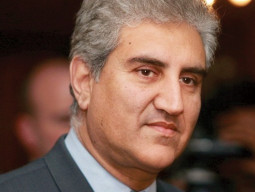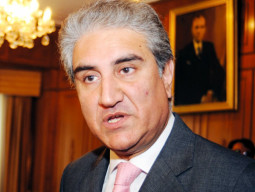
ISLAMABAD: While placing its troops along the Line of Control (LoC) and the Working Boundary (WB) on 'high alert,' Pakistan launched a diplomatic offensive to counter Indian attempts to link Islamabad with Thursday's Pulwama attack in which 44 Indian paramilitary soldiers were killed.
Hours after New Delhi pointed fingers at Pakistan and threatened to take "revenge", Pakistan on Friday reached out to the five permanent members of United National Security Council (UNSC) to offset the Indian propaganda.
Foreign Secretary Tehmina Janjua invited ambassadors of P-5 countries -- US, China, Russia, Britain and France -- at the foreign ministry to brief them about the worsening situation. Janjua strongly rejected Indian allegations against Pakistan following the attack.
"She noted a familiar Indian pattern of immediate and reflexive assignment of blame on Pakistan without investigations," according to a statement issued by the foreign office. The foreign secretary said that Pakistan had pursued a "constructive approach" towards India, it added.
Modi warns of ‘strong reply’ to Kashmir attack as India withdraws Pakistan’s MFN status
"Pakistan's offer of dialogue and the Kartarpur initiative are a clear evidence of this," the statement quoted the foreign secretary as saying. "Ratcheting up tensions in the region will be counterproductive," she told the envoys.
Meanwhile, Pakistan put its troops along the LoC and the WB on 'high alert' to deal with any 'misadventure' from across the border in the wake of Thursday's deadly attack in Indian-Occupied Kashmir, officials here said.
Modi criticised over anti-Pakistan rhetoric
The attack -- around 20 kilometres from the city of Srinagar on the main highway to Jammu -- apparently claimed by the banned Jaish-e-Mohammad (JeM) was the worst in Indian-occupied Kashmir in three decades.
India was quick to blame Pakistan even before their investigators reached the site to start probe. The Pakistani high commissioner was summoned by the Indian foreign secretary to issue a formal protest over the attack.
Islamabad, however, rejected the Indian allegations and insisted that it always condemned 'heightened violence' in the valley. India's acting high commissioner was called to the foreign office to convey Pakistan's strong protest over Indian government's attempts to link Islamabad with the Pulwama attack.
Sources said the acting US ambassador also met Foreign Secretary Tehmina Janjua at the foreign office to discuss the deteriorating situation. White House had earlier condemned the Pulawma attack and called on Pakistan to "end immediately the support and safe haven provided to all terrorist groups operating on its soil, whose only goal is to sow chaos, violence, and terror in the region."
A senior official here said Pakistan was closely assessing the situation and civil and military leadership began consultations to deal with any provocation from across the border. The official, who requesting anonymity, told The Express Tribune that Pakistan did not want any escalation in tensions but added that it would not take any chances either.
To review the situation, a meeting of the National Security Committee (NSC) is expected next week following the visit of Saudi Crown Prince Mohammed bin Salman.
But officials confirmed that that the troops deployed along the LoC and WB had been put on high alert to deal with any 'misadventure' from India. With Indian elections round the corner, there is fear in Pakistan that the ruling Bharatiya Janata Party (BJP) may use the Pulwama attack to up the ante and 'war hysteria.'
"We are very much aware of this and devising our strategy accordingly," said a foreign office official.
Indian Prime Minister Narendra Modi after chairing a high-level security meeting on Friday threatened to punish those who perpetrated the Pulwama attack. The Indian media has been speculating that many options, including "intelligence-based operations" inside Pakistan were being contemplated.
Other than the military options, the Modi administration also decided to launch diplomatic offensive to "isolate Pakistan globally". The Indian government also decided to withdraw the Most-Favoured Nation (MFN) to Pakistan.
There has been no formal reaction to the latest Indian move by Pakistani officials said the withdrawal of MFN status will have little impact, since India had placed many 'non-tariff barriers' on the Pakistani products.
But the development certainly signalled a further deterioration in the already tense ties. The Indian high commissioner was also called back from Islamabad for consultations. It was, however, not clear if India would downgrade diplomatic relations with Pakistan.


































































COMMENTS
Comments are moderated and generally will be posted if they are on-topic and not abusive.
For more information, please see our Comments FAQ